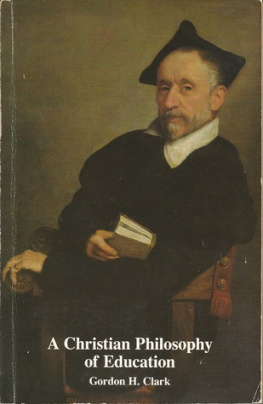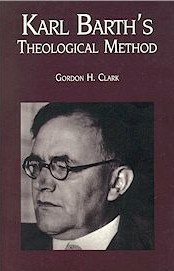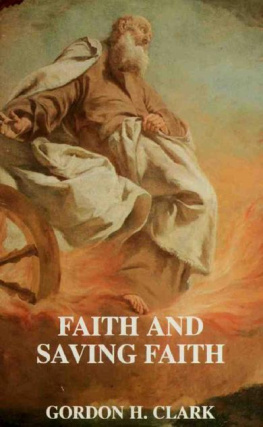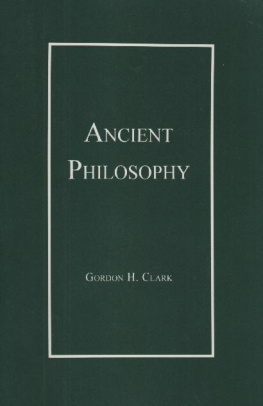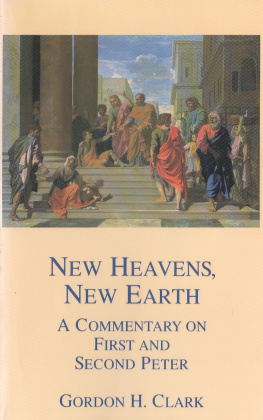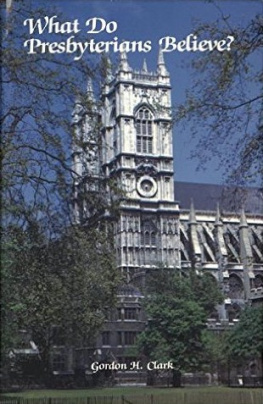Gordon H. Clark - A Christian Philosophy of Education
Here you can read online Gordon H. Clark - A Christian Philosophy of Education full text of the book (entire story) in english for free. Download pdf and epub, get meaning, cover and reviews about this ebook. year: 1987, publisher: Trinity Foundation, genre: Religion. Description of the work, (preface) as well as reviews are available. Best literature library LitArk.com created for fans of good reading and offers a wide selection of genres:
Romance novel
Science fiction
Adventure
Detective
Science
History
Home and family
Prose
Art
Politics
Computer
Non-fiction
Religion
Business
Children
Humor
Choose a favorite category and find really read worthwhile books. Enjoy immersion in the world of imagination, feel the emotions of the characters or learn something new for yourself, make an fascinating discovery.
- Book:A Christian Philosophy of Education
- Author:
- Publisher:Trinity Foundation
- Genre:
- Year:1987
- Rating:3 / 5
- Favourites:Add to favourites
- Your mark:
- 60
- 1
- 2
- 3
- 4
- 5
A Christian Philosophy of Education: summary, description and annotation
We offer to read an annotation, description, summary or preface (depends on what the author of the book "A Christian Philosophy of Education" wrote himself). If you haven't found the necessary information about the book — write in the comments, we will try to find it.
A Christian Philosophy of Education — read online for free the complete book (whole text) full work
Below is the text of the book, divided by pages. System saving the place of the last page read, allows you to conveniently read the book "A Christian Philosophy of Education" online for free, without having to search again every time where you left off. Put a bookmark, and you can go to the page where you finished reading at any time.
Font size:
Interval:
Bookmark:
Gordon H. Clark
The Trinity Foundation Jefferson, Maryland
This great book [A Christian Philosophy of Education] with its commendable candor, rugged vigor, and transparent honesty, deserves to get the attention of a vast audience.
The Southern Presbyterian Journal
Gordon Clark is one of the profoundest evangelical Protestant philosophers of our time.... Those who have not yet read his works have a rewarding opportunity awaiting them.
Carl F.H. Henry
Clarks thinking is... a magnificent and earnest effort to bring all things into captivity to Christ and his word.... Clark [is] one of the most distinguished Christian thinkers of our time.
Westminster Theological Journal
Cover: Titians Schoolmaster Giovanni Battista Moroni
National Gallery of Art, Washington; Widener Collection
A Christian Philosophy of Education
1946 Lois A. Zeller and Elizabeth Clark George Second revised edition 1988 The Trinity Foundation Post Office Box 169 Jefferson, Maryland 21755 Printed in the United States of America.
ISBN: 0-940931-20-6
Foreword
Preface
Chapter 1. The Need for a World-View
Chapter 2. The Christian World-View
Chapter 3. The Alternative to Christian Theism
Chapter 4. Neutrality
Chapter 5. Ethics
Chapter 6. The Christian Philosophy of Education
Chapter 7. Academic Matters
Chapter 8. From Kindergarten to University
Appendix A: The Relationship of Public Education to Christianity
Appendix B: A Protestant World-View
Appendix C: Art and the Gospel
Scripture Index
Index
The Crisis of Our Time
Intellectual Ammunition
Readings in Ethics (1931)
Selections from Hellenistic Philosophy (1940)
A History of Philosophy (coauthor, 1941)
A Christian Philosophy of Education (1946, 1988)
A Christian View of Men and Things (1952)
What Presbyterians Believe (1956)1 Thales to Dewey (1957)
Dewey (1960)
Religion, Reason and Revelation (1961, 1986)
William James (1963)
Karl Barths Theological Method (1963)
The Philosophy of Science and Belief in God (1964, 1987) What Do Presbyterians Believe? (1965, 1985)
Peter Speaks Today (1967)
The Philosophy of Gordon H. Clark (1968)
Biblical Predestination (1969) Historiography: Secular and Religious (1971)
II Peter (1972)2
The Johannine Logos (1972)
Three Types of Religious Philosophy (1973)
First Corinthians (1975)
Colossians (1979)
Predestination in the Old Testament (1979) I and II Peter (1980)
Language and Theology (1980)
First John (1980)
Gods Hammer The Bible and Its Critics (1982, 1987) Behaviorism and Christianity (1982)
Faith and Saving Faith (1983)
In Defense of Theology (1984)
The Pastoral Epistles (1984)
The Biblical Doctrine of Man (1984)
The Trinity (1985)
Logic (1985)
Ephesians (1985)
Clark Speaks From the Grave (1986)
Logical Criticisms of Textual Criticism (1986)
First and Second Thessalonians (1986)
Predestination (1987)
The Atonement (1987)
Americans spend, collectively and severally, voluntarily and involuntarily, $300 billion on education each year, federal, state and local governments appoint commissions to discover why public education has failed; and books analyzing and lamenting the state of American education become runaway best-sellers. Yet with all this expenditure and activity American education continues to worsen, for not one American in a thousand understands the proper purpose of education.
The end of learning, wrote John Milton, is to repair the ruin of our first parents by regaining to know God aright, and out of that knowledge to love him, to imitate him, to be like him.... If this be soand the Bible says it is sothen the aims of education in America are all wrong.
The purpose of education is not to enable the student to earn a good income.
The purpose of education is not to preserve our American system of government and political freedom.
The purpose of education is not world unification.
The purpose of education is not to teach young people a trade.
The purpose of education is not to encourage the never-ending search for truth.
The purpose of education is not to put the student in harmony with the cosmos.
The purpose of education is not to raise the consciousness of students and train them for world revolution.
The purpose of education is not to prepare students for productive careers.
The purpose of education is not to integrate the races.
The purpose of education is not the social adjustment of the child.
The purpose of education is not to stay ahead of the Russians (or the Japanese) in technology.
The purpose of education is not to create good citizens.
No, the purpose of education is far different, far more noble than any of these things. The purpose of education is to make Christian men, men transformed by the renewing of their minds after the image of Him who created them.
Yet the educational system in the United States is hostile to such education. It regards men as trousered apes, and its products, understandably enough, behave like untamed animals. The focus of American education, if one can speak of it having a focus, is not merely on this world, but on the most unimportant things in this world. The various educational philosophies in vogue in the last half of the twentieth century agree in only one thing: their opposition to Christianity.
The anti-Christian origins of our anti-Christian public school system were explained more than a century ago by a Unitarian turned Roman Catholic, Orestes Brownson. Describing a movement of which he was a part in the early nineteenth century, the utopian socialism of Robert Owen, the Scottish industrialist, Brownson wrote:
The great object was to get rid of Christianity, and to convert our churches into halls of science. The plan was not to make open attacks on religion, although we might belabor the clergy and bring them into contempt where we could; but to establish a system of state,we said national schools, from which all religion was to be excluded, in which nothing was to be taught but such knowledge as is verifiable by the senses, and to which all parents were to be compelled by law to send their children.... The first thing to be done was to get this system of schools established. For this purpose, a secret society was formed, and the whole country was to be organized somewhat on the plan of the carbonari of Italy, or as were the revolutionists throughout Europe by Bazard preparatory to the revolutions of 1820 and 1830.... [T]he plan has been successfully pursued, the views we put forth have gained great popularity, and the whole action of the country on the subject has taken the direction we sought to give it... ?
Now, after more than a century of government education, the effects of this anti-Christian educational system are becoming clear even to some non-Christians. But while the non-Christians see the problemsthe crime, the drugs, the promiscuity, the diseases, the illiteracy, the ignorance, the disbelief in truththey do not see the solution. A University of Chicago Professor, Allan Bloom, published a best-selling book on education last year, The Closing of the American Mind. In his book, Professor Bloom, who is not a Christian, offers a brilliant analysis of the moral and epistemological relativism that now controls our entire culture, including education, the view that all values are relative, and there is no truth, but only various truths. But while his analysis is acute and, at times, brilliant, Bloom is like the doctor who diagnoses the disease but never prescribes a cure. Or worse, the doctor prescribes a treatment that will exacerbate, not meliorate, the disease.
Font size:
Interval:
Bookmark:
Similar books «A Christian Philosophy of Education»
Look at similar books to A Christian Philosophy of Education. We have selected literature similar in name and meaning in the hope of providing readers with more options to find new, interesting, not yet read works.
Discussion, reviews of the book A Christian Philosophy of Education and just readers' own opinions. Leave your comments, write what you think about the work, its meaning or the main characters. Specify what exactly you liked and what you didn't like, and why you think so.

